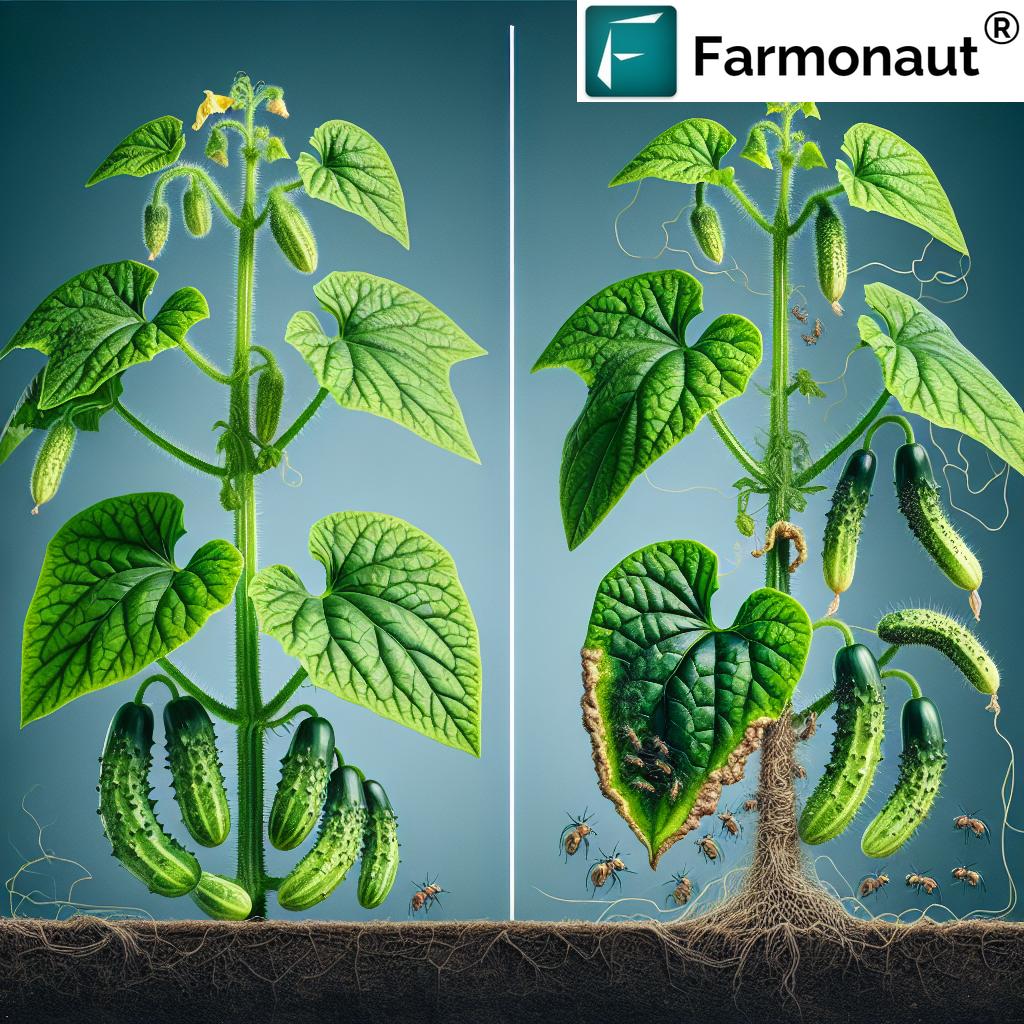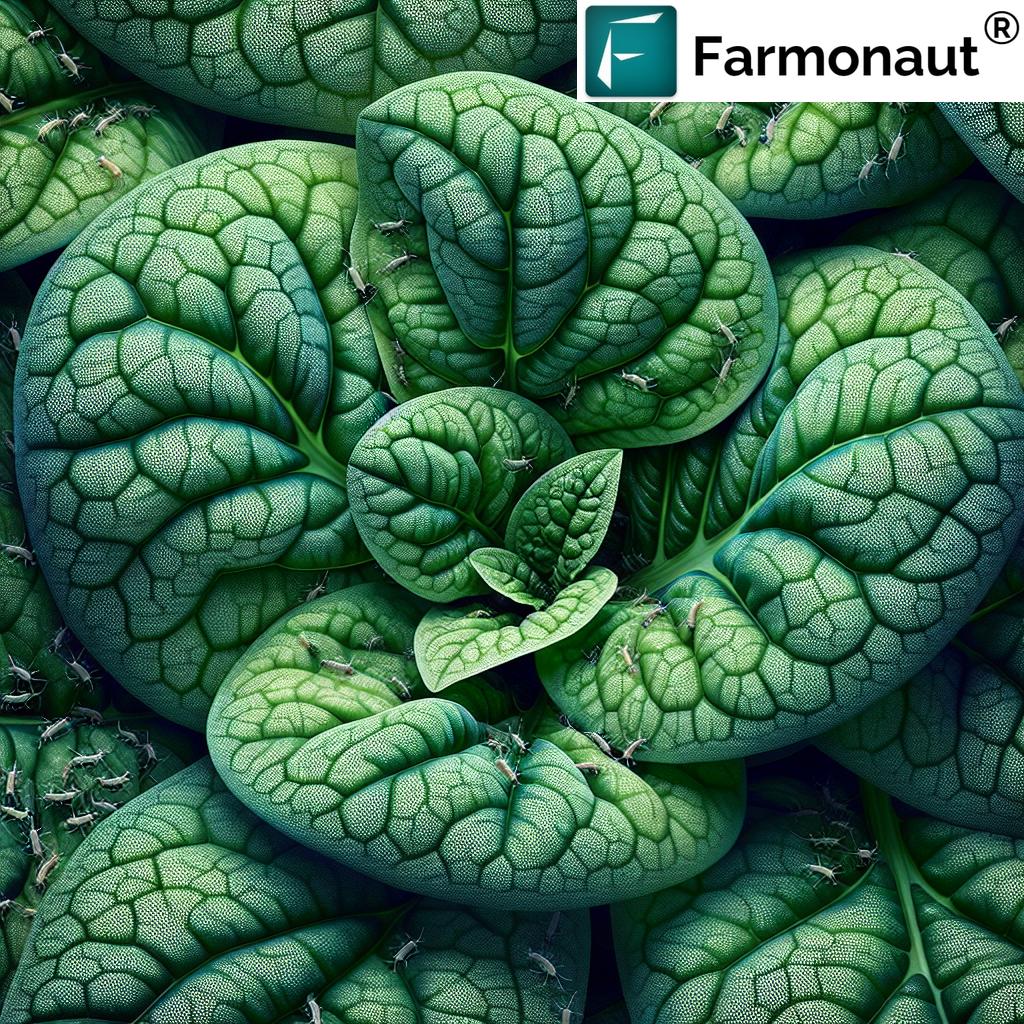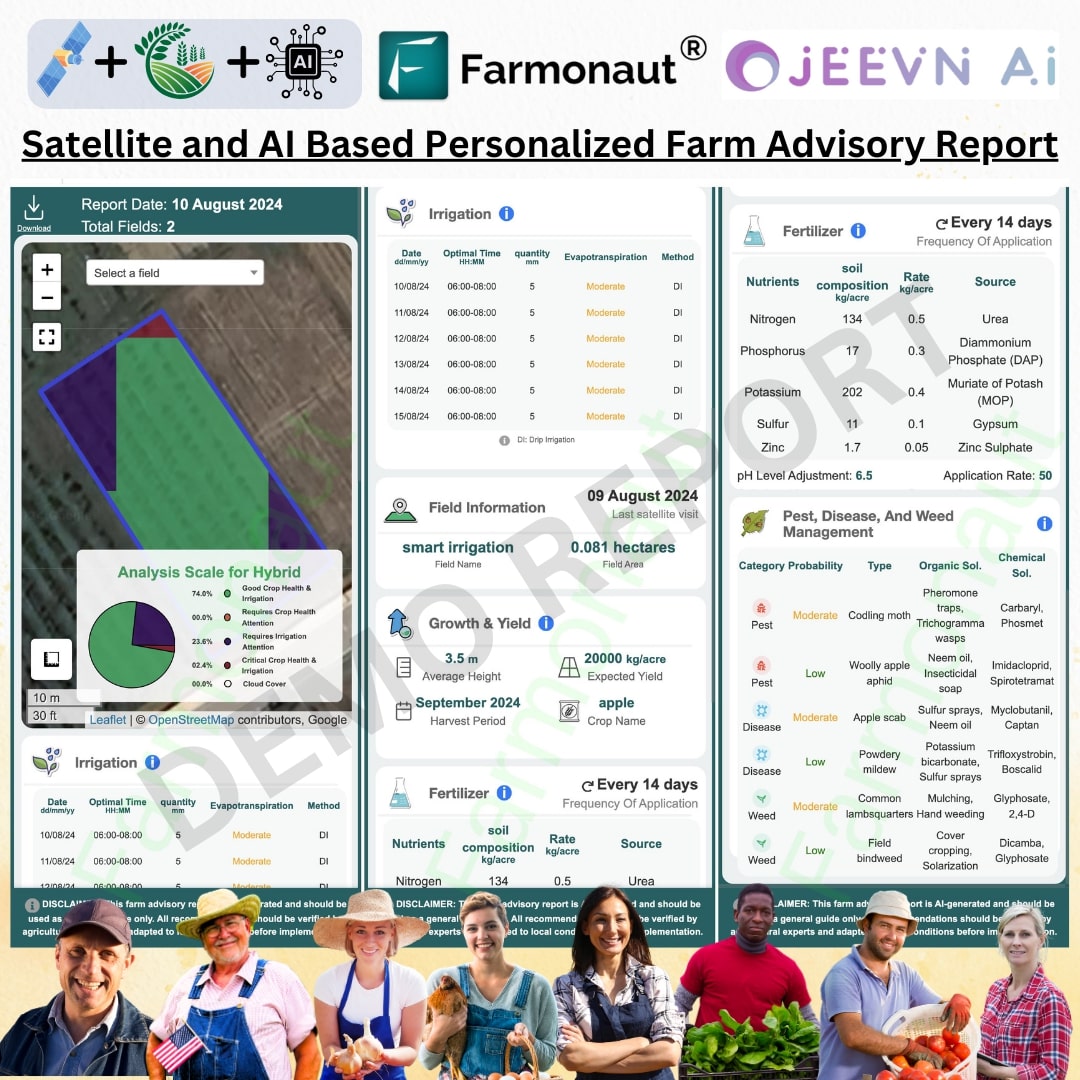Organic vs. Chemical: Controlling Aphids and CMV in Cucumber and Spinach Crops

As agricultural experts at Farmonaut, we understand the challenges that farmers face when it comes to protecting their crops from pests and diseases. In this comprehensive guide, we’ll explore the methods for controlling aphids and Cucumber Mosaic Virus (CMV) in cucumber and spinach crops, comparing organic and conventional approaches. We’ll also discuss how our satellite-based farm management solutions can help in early detection and prevention of these issues.
Understanding the Threat: Aphids and CMV
Before we delve into control methods, it’s crucial to understand the nature of the threats we’re dealing with.
Aphids: The Tiny Terrors
Aphids are small, soft-bodied insects that feed on plant sap. They can cause significant damage to crops by:
- Weakening plants through excessive sap feeding
- Transmitting plant viruses, including CMV
- Secreting honeydew, which promotes the growth of sooty mold
These pests reproduce rapidly, making early detection and control essential.
Cucumber Mosaic Virus (CMV): A Widespread Threat
CMV is a plant virus that affects a wide range of crops, including cucumbers and spinach. It’s primarily spread by aphids and can cause:
- Stunted growth
- Mottled or mosaic patterns on leaves
- Distorted fruits
- Significant yield losses
Once a plant is infected with CMV, there’s no cure, making prevention crucial.
Early Detection: The Key to Effective Control
At Farmonaut, we believe that early detection is the cornerstone of effective pest and disease management. Our satellite-based crop health monitoring system can help farmers identify potential issues before they become severe.
| Detection Method | Early Warning | Precision | Coverage Area | Cost-Effectiveness |
|---|---|---|---|---|
| Farmonaut Satellite System | High | High | Large Scale | High |
| Manual Scouting | Medium | Medium | Limited | Low |
Our system uses multispectral satellite imagery to detect changes in crop health that may indicate pest infestation or disease. This allows farmers to take action quickly, potentially preventing widespread damage.
Organic Control Methods for Aphids and CMV
Many farmers are turning to organic methods to control pests and diseases. These approaches focus on working with nature to create a balanced ecosystem that naturally suppresses pest populations.
1. Companion Planting
Planting certain crops together can help repel aphids and attract beneficial insects. Some effective companions for cucumbers and spinach include:
- Marigolds
- Nasturtiums
- Dill
- Garlic
2. Beneficial Insects
Encouraging or introducing natural predators of aphids can help keep populations in check. Some beneficial insects include:
- Ladybugs
- Lacewings
- Parasitic wasps
3. Neem Oil
Neem oil is a natural insecticide that can be effective against aphids. It works by disrupting the feeding and breeding habits of these pests.
4. Insecticidal Soaps
Organic insecticidal soaps can be used to control aphid populations without harming beneficial insects.
5. Reflective Mulches
Using reflective mulches around plants can confuse aphids and prevent them from landing on your crops.
6. Pruning and Sanitation
Regularly removing infected plant parts and weeds can help prevent the spread of CMV.
Conventional Control Methods for Aphids and CMV
While organic methods are gaining popularity, conventional chemical approaches are still widely used due to their effectiveness and speed of action.
1. Systemic Insecticides
These insecticides are absorbed by the plant and kill aphids when they feed on the plant sap. They can provide long-lasting protection but should be used carefully to avoid harming beneficial insects.
2. Contact Insecticides
These chemicals kill aphids on contact. They’re effective for quick control but may need to be reapplied frequently.
3. Insect Growth Regulators
These chemicals interfere with the growth and development of aphids, preventing them from reaching maturity and reproducing.
4. Aphicide-treated Seeds
Seeds treated with insecticides can provide early protection against aphids and the viruses they transmit.
5. Chemical Weed Control
Using herbicides to control weeds can help reduce reservoirs of CMV and other viruses.
Integrated Pest Management: The Best of Both Worlds
At Farmonaut, we advocate for an Integrated Pest Management (IPM) approach, which combines the best of organic and conventional methods. This strategy involves:
- Regular monitoring of crop health
- Using cultural practices to prevent pest and disease issues
- Employing biological controls when possible
- Using chemical controls only when necessary and in a targeted manner
Our satellite-based monitoring system plays a crucial role in IPM by providing early warning of potential issues, allowing farmers to take action before problems escalate.
The Role of Technology in Modern Pest and Disease Control
Advanced technology is revolutionizing the way we approach pest and disease control in agriculture. At Farmonaut, we’re at the forefront of this revolution with our satellite-based farm management solutions.
Satellite Imagery for Early Detection
Our system uses multispectral satellite imagery to detect subtle changes in plant health that might indicate pest infestation or disease. This allows for early intervention, potentially preventing widespread damage.
AI-Powered Advisory System
Our Jeevn AI advisory system analyzes satellite data along with other inputs to provide personalized recommendations for pest and disease control. This helps farmers make informed decisions about when and how to intervene.
Precision Application of Treatments
By identifying specific areas of concern, our technology enables farmers to apply treatments only where they’re needed. This targeted approach can reduce overall pesticide use, benefiting both the environment and the farmer’s bottom line.
Case Study: Cucumber and Spinach Protection with Farmonaut
While we don’t have specific case studies to share, we can discuss how our technology could potentially be applied to protect cucumber and spinach crops from aphids and CMV:
- Early Detection: Our satellite imagery could detect changes in crop health indicative of aphid infestation or CMV infection before visible symptoms appear.
- Targeted Intervention: By identifying specific areas of concern, farmers could apply treatments only where needed, reducing overall pesticide use.
- Ongoing Monitoring: Regular satellite updates would allow farmers to track the effectiveness of their interventions and make adjustments as needed.
- Data-Driven Decision Making: Our AI advisory system could provide personalized recommendations based on the specific conditions in each field.
The Future of Pest and Disease Control
As we look to the future, we see several trends emerging in the field of pest and disease control:
1. Precision Agriculture
Technologies like those we offer at Farmonaut will continue to evolve, allowing for increasingly precise and targeted interventions.
2. Biological Controls
Research into new biological control agents, including beneficial microorganisms, is ongoing and promising.
3. Gene Editing
CRISPR and other gene-editing technologies may lead to the development of crops with enhanced resistance to pests and diseases.
4. AI and Machine Learning
These technologies will play an increasing role in predicting pest outbreaks and optimizing control strategies.
5. Sustainable Chemistry
The development of new, more environmentally friendly pesticides will continue, providing effective control with reduced environmental impact.
Conclusion: A Holistic Approach to Crop Protection
Protecting cucumber and spinach crops from aphids and CMV requires a multifaceted approach. While both organic and conventional methods have their place, we believe that an integrated approach, supported by advanced technology, offers the best path forward.
At Farmonaut, we’re committed to providing farmers with the tools they need to make informed decisions about crop protection. Our satellite-based monitoring system, combined with our AI-powered advisory services, can help farmers detect issues early, intervene effectively, and optimize their pest and disease control strategies.
By embracing a holistic approach that combines cultural practices, biological controls, judicious use of pesticides, and cutting-edge technology, we can work towards a future of sustainable, productive agriculture.

FAQs
-
Q: How can I tell if my cucumber plants are infected with CMV?
A: Look for symptoms such as mottled or mosaic patterns on leaves, stunted growth, and distorted fruits. However, early detection can be challenging, which is why technologies like our satellite-based monitoring system can be valuable. -
Q: Are organic methods as effective as chemical methods for controlling aphids?
A: Organic methods can be highly effective when used as part of an integrated pest management strategy. While they may work more slowly than chemical methods, they often provide more sustainable long-term control. -
Q: How often should I monitor my crops for aphids and CMV?
A: Regular monitoring is crucial. With traditional methods, weekly inspections are recommended. However, our satellite-based system can provide daily updates on crop health, allowing for continuous monitoring. -
Q: Can CMV spread from cucumbers to spinach?
A: Yes, CMV has a wide host range and can indeed spread from cucumbers to spinach and many other crops. This is why comprehensive pest and disease management strategies are important. -
Q: How can Farmonaut’s technology help in controlling aphids and CMV?
A: Our satellite-based monitoring system can detect changes in crop health that may indicate pest infestation or disease, allowing for early intervention. Our AI advisory system can then provide personalized recommendations for control measures.
For more information on how Farmonaut can help you protect your crops, visit our website or download our app:
For developers interested in integrating our technology into their own systems, check out our API documentation:
Ready to take your farm management to the next level? Subscribe to Farmonaut today:

